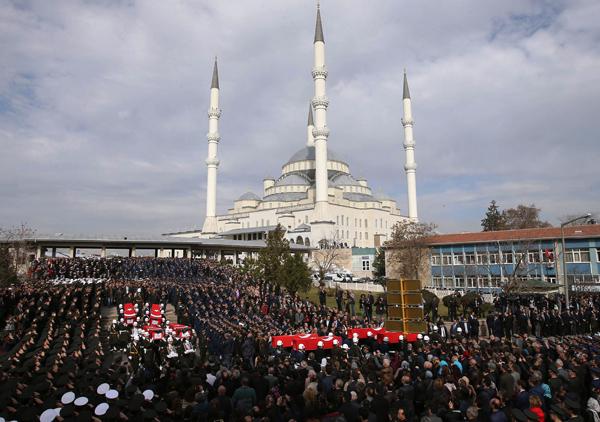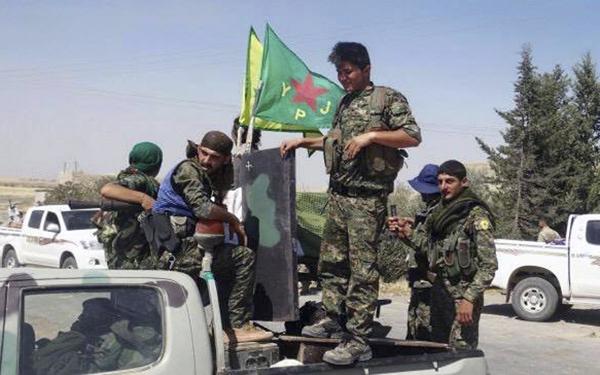You are here
US scepticism on blame for Turkey attack exposes growing split
By AFP - Feb 20,2016 - Last updated at Feb 20,2016

Honour guards carry the Turkish flag-draped coffins of car bombing victims during a funeral ceremony at Kocatepe Mosque in Ankara on Friday (AFP photo)
ANKARA — Turkey has pinned the blame for a deadly attack in Ankara on Syrian Kurdish fighters — but its assertions have been greeted with scepticism from chief NATO ally the United States in a rare and increasingly acrimonious split.
Just a day after Wednesday's attack on a convoy of military buses left 28 people dead, President Recep Tayyip Erdogan said investigators had already worked out it was a joint operation by Turkey-based Kurdish militants and their counterparts in Syria.
But the US State Department responded that responsibility for the attack was still an "open question" and that it could neither confirm or deny Ankara's claims.
Syria's Democratic Union Party (PYD) denied any involvement in the bombing, which comes against the backdrop of a growing hostility over the role of the Syrian Kurds in the five-year civil war.
The attack was claimed late Friday by a Turkey-based Kurdish militant group Kurdistan Freedom Falcons (TAK), which said the bomber was a Turkish citizen from the eastern city of Van.
Turkey accuses the PYD and its People's Protection Units (YPG) militia of being the Syrian offshoot of the Kurdistan Workers Party (PKK) which has fought an over 30-year insurgency against the Turkish state in search of greater powers and rights for the country's Kurdish minority.
"Regardless of its validity, Turkey's attribution of the attack to the YPG reflects Turkey's intent to put pressure on the US policy of supporting the PYD," said Ege Seckin, expert at IHS Country Risk.
'Brave Kurdish fighters?'
In a bid to up the diplomatic pressure on world powers to condemn the YPG, ambassadors from the five permanent UN Security Council members plus Germany were "invited" by Turkey to receive a briefing on the bombing Thursday.
A Western diplomat, speaking on condition of anonymity, told AFP that there was "no hard evidence of a YPG link" presented to the diplomats at the meeting.
Kurdish fighters' recent advance into territory controlled by Turkey-backed rebels in northern Aleppo near the Turkish border has worried Ankara, which clearly set the Euphrates River as a "red line" that must be the limit of their westwards drive.
The PYD's offensive has severed Turkey's supply lines to Syrian rebels around Aleppo province, and in response, Turkish artillery has shelled YPG positions in northern Syria the entire week.
"Maybe it's true, maybe not," the diplomat said of Turkey's claim that Syrian Kurdish fighters were behind the Ankara bombing.
"But in both cases it justifies bombarding YPG positions in Syria."
The United States and Turkey are both opponents of Syrian President Bashar Assad's regime in Damascus.
But Washington concentrates its current campaign strictly on the Daesh jihadists and sees Syrian Kurdish militia as the most effective force fighting on the ground against the extremists.
US State Department spokesman John Kirby on Thursday described the YPG as "brave Kurdish fighters" against Daesh.
Nihat Ali Ozcan, security expert at the Ankara-based TEPAV think-tank, said there would be consequences for Washington preferring a mere "player in Syria" to a "legitimate state" like Turkey.
He added that Turkey has a major lever in the shape of its Incirlik Air Base, which in the last months has become a crucial hub for US raids against Daesh in Syria.
'US has no choice'
But Turkey is hoping to galvanise American support in the wake of the Ankara attack for a ground operation into Syria with its allies, analysts say.
A senior Turkish official said last week that Turkey was in favour of a ground operation in Syria to end the fighting, but only with its Western and Gulf allies, and aimed at not just Daesh but the Syrian regime and the YPG.
"Turkey is already in Syria with a covert operation and it is not possible to turn it into an open one without support from allies including the United States," Ozcan told AFP.
Turkey has long been pressing, with limited success, for a safe zone inside Syria free from Daesh militants and YPG militia to house Syrian refugees.
But Max Abrahms, professor of political science at Northeastern University and a member of the US Council on Foreign Relations think-tank, said the US would "not back away from the collaboration with the YPG even if attacks in Turkey are attributed to Kurdish terrorists".
"The US really has no choice but to collaborate with the YPG in Syria because of the absence of alternative ground forces," he told AFP.
Related Articles
ISTANBUL — After months of tensions, Turkey is taking on Syrian Kurdish fighters inside Syria in a move that risks inflaming tensions with i
ISTANBUL — Turkey called on Thursday for the removal of the US diplomat coordinating the international coalition fighting the Daesh terror g
ANKARA — Turkey hit Kurdish militia targets in northern Syria for the second time in less than 72 hours, the military said on Saturday, as A



















